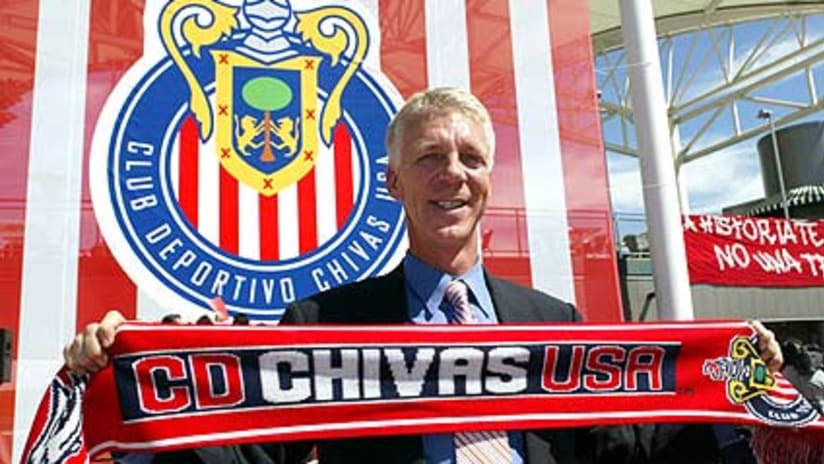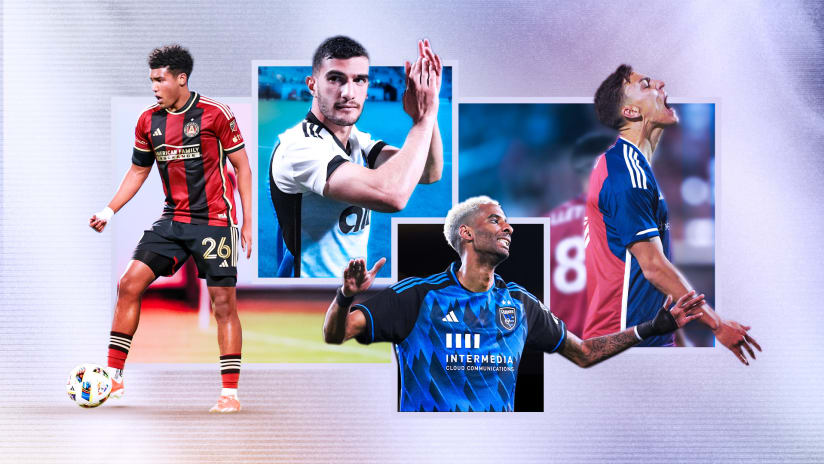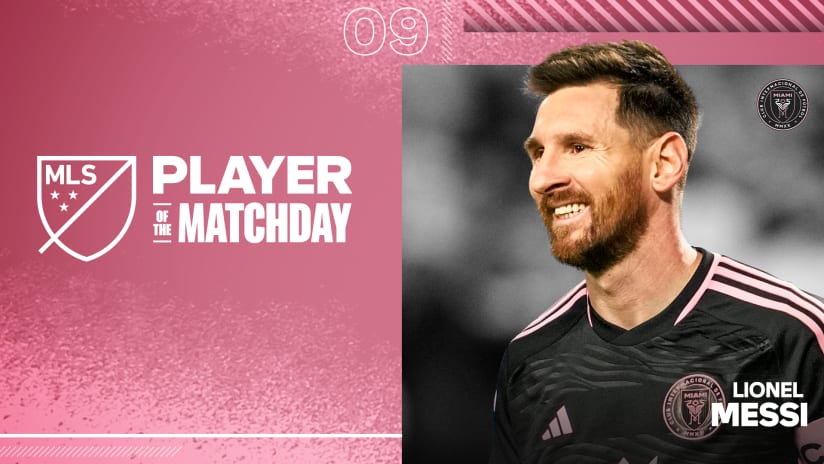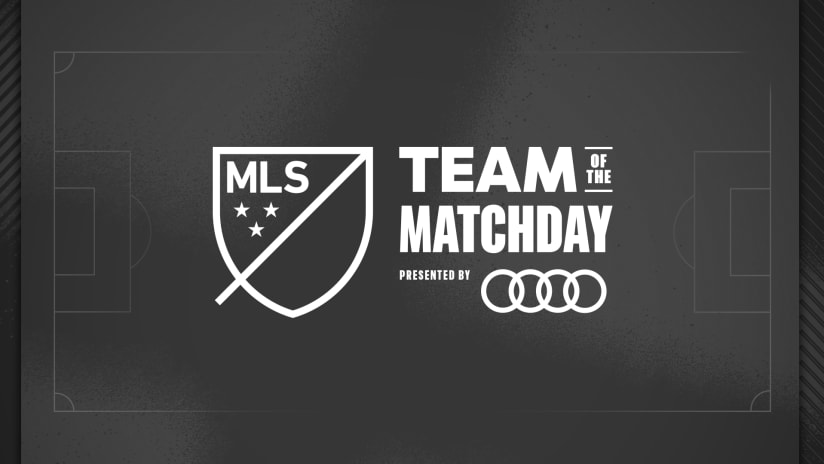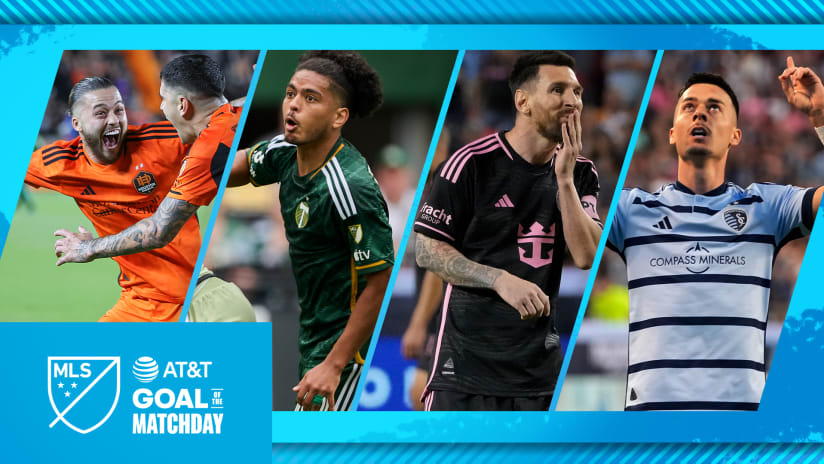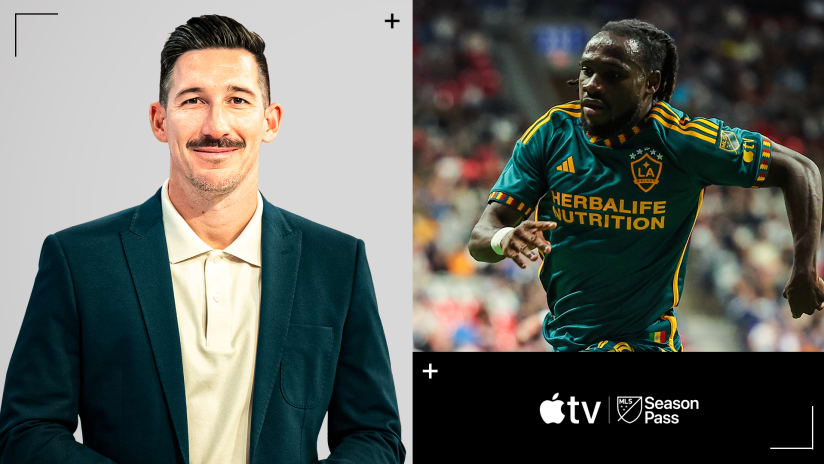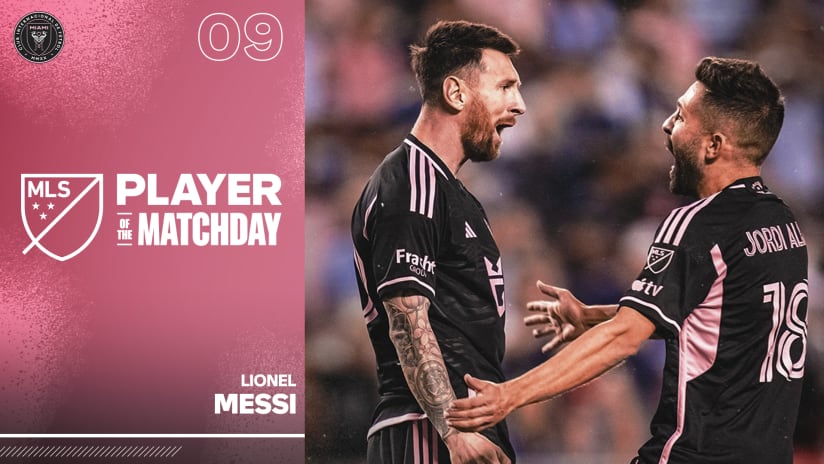obviously, I've coached there for six years -- and I have very good knowledge of the Mexican league, which is a league just south of our border that we see on television, on Univision and Telemundo very frequently. My MLS teams, specifically D.C. United, played many times against Mexican teams in real competition -- the CONCACAF Champions' Cup -- and as I said, [I've made] many visits to Guadalajara with MLS teams, but also privately to look at their setup. I feel that I have a very good understanding of what's required in MLS to be successful as a player, what those players that will come here can expect, and I will translate that to them. Foremost, I think we're trying to put a team on the field that can be competitive from the opening day and has some influences that will carry over from Guadalajara but will have its own identity as well.
MLSnet.com: How do you think your new stint in MLS will differ from your previous spell in the league?
Rongen: The league has made tremendous progress in all areas like the development of the game and the players becoming more competitive. I think this year is a great indication, if you look at both [conferences]. There are still races for first places. There are still races for playoff positions. There are still races for the teams that aren't going to make the playoffs with four or five games to go. I think that speaks volumes of the parity we have right now.
I think that technically and tactically, we've made great strides. Clearly, teams have more experience with the tough demands in MLS, like travel that most players in other parts of the world are not accustomed to; different surfaces: (FieldTurf in) New York vs. grass in L.A. is different; time changes, something that most players might not be accustomed to; midweek games; the Open Cup and national team call-ups. We have a lot of players in the league who are not only U.S. national team players, but international players who are taken away from their teams at given times.
I think I have a very keen understanding of how to build a team and what depth means, and I feel that clearly with my role with the [U.S.] soccer federation, with the under-20 team, has given me a very good feel for the young player in the U.S. and what's required for them to succeed at the next level. Bobby Convey played for me at D.C. United but was also an integral part of the under-20s. There's Eddie Gaven right now and potentially some players who haven't turned pro yet who could be out there in the SuperDraft.
My experience of building a team in Tampa Bay in the inaugural season is somewhat similar to building an expansion team. I think you've got to go in with a good understanding philosophically of how you want to play and what kind of players can execute the plan, and we'll do a very diligent job of looking at players, obviously out of the Chivas system, but also looking at what's available in the [expansion] draft and the SuperDraft and build our team accordingly to play attractive attacking football. History has shown that the teams I've coached always have been very productive, and I think that's what is expected from our fans here in Los Angeles.
MLSnet.com: When you built the Tampa Bay Mutiny back in 1996, the rest of the league was also just getting started. Do you think it will be more difficult starting a team from scratch this time around because ten other teams have a head start?
Rongen: I think that only time will tell. Teams have gone through one [expansion] draft with Chicago and Miami. They've become a little keener in who to protect and not to protect. Back then, maybe salary cap issues weren't that important. Now, you'll find players via the [expansion] draft that might be there because of their cap number, not necessarily what kind of a player they are. So, it's going to be very interesting to see what will be available then, what will be available in the SuperDraft, and how we need to use our three allocations and our discovery wisely.
What we're trying to do is build a very competitive team from day one. Only time will tell if this time around it will be easier or harder, but I think that clearly, going into [the league's] 10th year, teams have established themselves, coaches have been in place -- in certain situations -- for a few years. There's a core base of players at each club that have played together for a while. It's going to be a daunting task, but one that we look forward to. It's going to be a great challenge, and I feel that we can be successful in our first year.
MLSnet.com: CD Chivas USA investor-operator Jorge Vergara is well known for both his passion and his high expectations. Are you at all nervous about trying to meet those expectations?
Rongen: One of the reasons I was interested in the job was because of that. This team -- and it's no disrespect toward any other team -- will be the truest team to a central, South American, European flavor. There will be more media attention. The fans will be not necessarily more educated, but more passionate about their team, which means they're more opinionated and stronger about wins and losses, which I think is healthy. This league will have a great opportunity to see what passion and tradition is all about when they see the Chivas fans follow this team, not only at home, but surely on the road as well. I would only welcome that. It's part of the business. I love those challenges. I don't shy away from expectations. They should be there as long as they're realistic. I can't wait to roll up the sleeves and get to work.
MLSnet.com: A lot has been made of the instant rivalry that will exist between Chivas USA and the Los Angeles Galaxy, both of whom will play at The Home Depot Center. How excited are you about the prospect of the Los Angeles 'derby'?
Rongen: I don't want to put it yet on the level of Celtic versus Rangers. There are so many examples of Boca-River, of Chivas-Atlas. I think it evokes more emotion. Games become very meaningful. Rivalry is healthy for the league, I think, and needed. I hope we can create something with Salt Lake City and Colorado, as well. We've seen it between D.C. and New York. In order for our sport to continue to do well, we've talked about development of players, we've talked about soccer-specific stadiums, and we've talked about reserve teams. I think our next step is to really get to the level where there's love and hate between two teams in one city. I think it makes for great games, great anticipation and tense talk before and after the game. And it gets us closer to other sports in this country. Even though we're a young sport - we're going into our tenth year - it's very significant, and it's very important.
MLSnet.com: The ownership of the club has said it will be primarily Spanish-speaking. Do you speak Spanish?
Rongen: I don't speak much. It's locker room Spanish. I was very fortunate to -- when I played in the NASL -- to be around players like Elias Figueroa and Nene Cubillas, and Javier Aguirre, the great Mexican captain of the national team, was a teammate of mine when I played for the L.A. Aztecs and went on to be the head coach of the Mexican national team. [I've also coached] players like Carlos Valderrama, Marco Etcheverry, Jaime Moreno and Raul Diaz Arce. I'm able to converse in the locker room, but I've made a very strong and conscious effort to say that I'm going to master the language fairly quickly, and I will. I'm going to take classes, and I want to be fluent in that language. I speak three other languages fluently, so it shouldn't be too hard for me to be able to carry on a conversation with players.
MLSnet.com: Do you think that by hiring someone whose native language is not Spanish, CD Chivas USA will be able to draw in fans who are MLS fans, but not already fans of Chivas?
Rongen: I think the most important thing for Chivas USA was to hire the right guy. I think it shows a commitment that they are willing to bring in people, regardless of language, that they feel can do a job. They really felt that they needed somebody with a good understanding of MLS that knows what a SuperDraft is all about, that knows how to trade within this league, that knows how to deal with a salary cap you don't deal with in other countries, and a guy who has an open mind -- like most Dutch people do -- to learn a particular language quickly. I really think they picked the right guy, regardless of background.
If you look internationally, you see it more and more. There are coaches in the Middle East, in Africa, in South America. Leo Beenhakker and Hans Westerhof in Mexico are great examples. Guus Hiddink took Korea to the final four in the last World Cup, but didn't speak Korean. The game is universal, and the language is universal as well. Saying that, I would like to be able to communicate with my players and front office staff in Spanish because I feel that's important to managing people. If the people will be mostly Spanish-speaking, I need to make an effort to integrate in their culture and understanding their language and speaking it.
MLSnet.com: What will you do in the next two months to prepare for the MLS expansion draft and to acquire your first players?
Rongen: We have a good framework of what we want to do. It will depend on what players will be available in the [expansion] draft. We won't know until after MLS Cup. I will continue to look at games in MLS. One of the great advantages is I know every player in MLS through my color analysis with D.C. United. I continue to follow games. I see them live. I get the package. That's a huge advantage. I have great knowledge of players on and off the field. A lot of players in this league have played for me at various levels, either with the Olympic team or the under-20 team or with D.C. United or even with Tampa. So I can talk about character and personality, too, besides just if they're good players on the field, which is important, as well.
In the meantime, I'll get a real good feel of what players we potentially could get from Chivas in Guadalajara. Our three senior internationals need to be good players. Obviously, some names have been bandied around, but that could still change based on the need that we feel. Maybe after the [expansion] draft, we may say, "You know what? These are some holes that we need to fill. We need to find our three international players for these particular positions."
I think we've got a pretty good framework of how we want to build this team and what's important, and how our next two or three months will be used to identify players, scout players, and build a team that could be very competitive. I'm going to spend some time in Guadalajara to watch all of the teams play. I'll be looking at their overall club culture and training philosophy to use some of that here as well. We'll have an assistant coach [Javier "Zully" Ledesma] who is from Chivas Guadalajara. I think it's important that we have a line with the club there, somebody who has played for the club at a high level, somebody who is an assistant there currently. I can't wait to share ideas with him. We've got a pretty good idea of where we want to go. We've really got a great facility in place, a great stadium to play in in a great city with a great fan base. That's all there. It's just a matter now of putting a good product on the field, and that's what we're prepared to do.
MLSnet.com: What kind of players will you be looking to acquire from Chivas de Guadalajara? Will they be veteran leaders or promising young players?
Rongen: I think it could be a combination of both. Leadership is important. Look at the teams that I've coached. Look at Frank Yallop in Tampa, and Cle Kooiman, Carlos Valderrama and Martin Vasquez. Those guys were just extensions of coaches in the locker room and on the field as well that young players could learn from. If you talk to Steve Ralston, he keeps talking about how much he learned from Carlos Valderrama as a rookie in 1996. Look at John Harkes, Jeff Agoos, Marco Etcheverry and Jaime Moreno at D.C. United, all important guys who were great in the locker room and set examples for younger players. I feel that every team needs experience and veteran players. That's obviously very important, but we have to also understand that we need some energy. We need some youth. And I think that we'll have both. We'll have a good combination of age and quality in our team.
Jason Halpin is a contributor to MLSnet.com. This story was not subject to the approval of Major League Soccer or its clubs.

